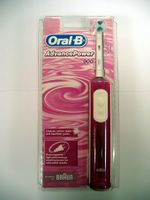TTAB Sends Gillette Canada Packing In "ORAL MAX" Opposition
Gillette Canada Company (d/b/a Oral-B Laboratories) didn't look too sharp in its botched attempt to oppose an application to register ORAL MAX & Design for "electric toothbrush and dental flossing units." The Board dismissed the opposition in Gillette Canada Co. v. Robin Research Labs., Inc., Opposition No. 91124984 (April 12, 2005) [not citable] because Gillette Canada failed to get into evidence its registrations and failed to prove prior use of its marks.

Gillette Canada pleaded likelihood of confusion with and dilution of its ORAL B and ORAL-B marks and claimed ownership of seven federal registrations for those marks. Applicant Robins Research, in its answer, admitted only that it owned the opposed application.
On the last day of its testimony period, Gillette Canada took the testimony of an employee of the Gillette Company (not of Gillette Canada), and filed the transcript and exhibits as its case-in-chief. Robins did not attend that testimony deposition, took no testimony of its own, and offered no evidence. Then, on the last day of its "rebuttal" period, Gillette Canada filed a notice of reliance on its registrations. However, that was way too late.

When it filed its notice of opposition, Gillette Canada attached plain copies of the registrations, not certified copies showing status and title. Then it neglected to prove ownership and current status of the registrations during its case-in-chief, either by way of testimony or via notice of reliance. See Rule 2.122(d) and TBMP Section 704.03(b).
The submission of a notice of reliance during rebuttal was ineffective for two reasons: (1) as mentioned, proof of ownership and status of registrations is part of opposer's case-in-chief, and (2) there was nothing for Gillette Canada to rebut because Robin Research did not submit any evidence.

As to the testimony of Opposer's witness, it did not establish the relationship between the Gillette Company and Opposer Gillette Canada Company, and in any case the witness gave no testimony regarding the registrations. There also was no testimony regarding use of specific marks for specific products, and no testimony of use of any marks prior to Robin's filing date.
In short, Gillette Canada's Section 2(d) claim was dismissed for failure to prove priority (either by way of registrations or use), and its dilution claim likewise failed because there was no showing that the ORAL-B marks became famous prior to applicant's filing date.
TTABlog comment: Isn't it time to revise the Rules to allow a party to attach copies of the entries from the TARR database, rather than require "status and title" copies of registrations? Does the PTO, when preparing "status and title copies," do anything other than check the TARR database anyway?
Text ©John L. Welch 2005. All Rights Reserved.




0 Comments:
Post a Comment
<< Home